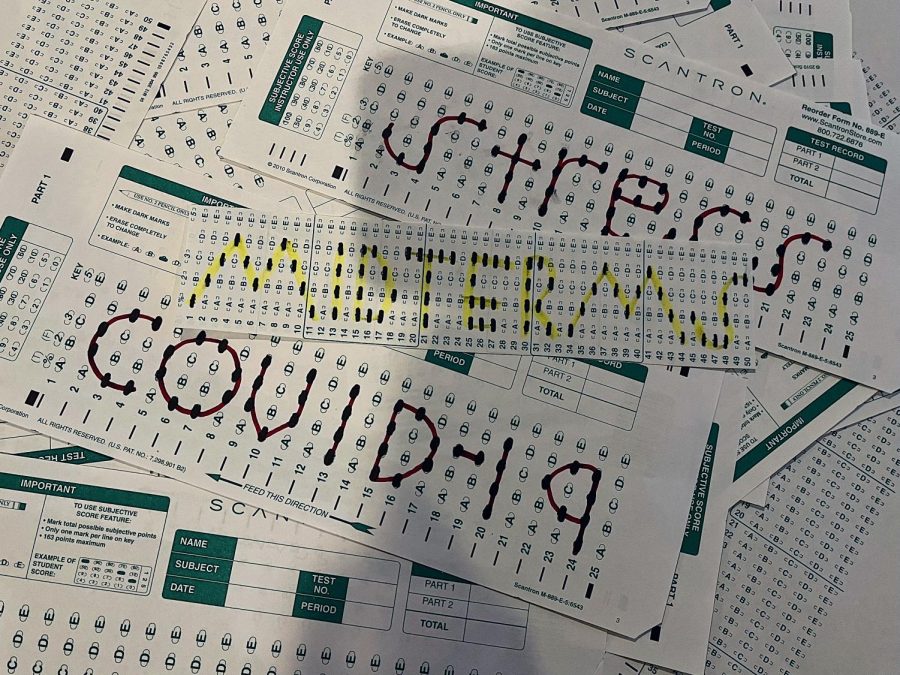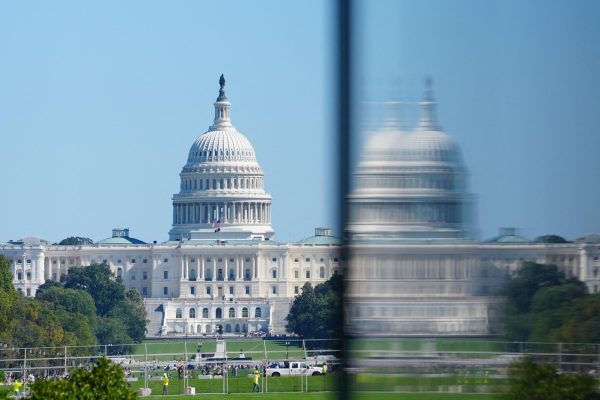NEWS COMMENTARY: Midterms’ unwanted comeback splits students & administrators
Photo by Isabella DeRose
Students must balance COVID-19 related stress in conjunction with test related anxiety as midterms approach for the first time since 2020.
It’s the most wonderful time of the year! As midterm season rapidly approaches, making a dreadful comeback for the first time since January 2020, a familiar pit of stress settles in students’ stomachs once more. For the first time, however, the pit must share its title as the ultimate anxiety inducer with an equally worthy competitor: COVID-19.
Students last year were relieved when administration made the conscious decision to eliminate midterms for the 2020-2021 school year, as they were impractical to implement during remote learning. This year, however, eager to reacquaint students with the normalcy of school practiced prior to the pandemic, the administration is adamant about re-installing midterms as if it were any other year.
“We’re trying to return to the same standards of rigor and academic set that we had prior to the pandemic,” principal Caesar Diliberto said. “Hence, the return to the midterms.”
Given the current COVID-19 climate, however, many students argue that the in-person inconsistency leading up to midterms qualifies the 2021-2022 school year as another abnormal year, in which these daunting, rigorous exams should be canceled. In fact, in a January Wire poll of 411 students, 78 percent said they were “not prepared at all” or “under-average prepared” for midterms, 40 percent said that COVID-19 had a significant impact on their feelings towards midterms and 79 percent said that West Essex should cancel midterms due to the current state of COVID.
Students’ arguments lie in the fact that despite our best efforts to convince ourselves that life is back to “normal,” we are not out of the woods yet in terms of the pandemic. Especially with the recent surge of the highly contagious omicron variant, West Essex has had both students and teachers quarantine for up to 10 days, thus forcing them to play catch-up on missed material while balancing the rigor of new lessons and work. This extended absence is daunting at any time of the year, but with midterms approaching, a test which covers an entire semester’s worth of material and counts for 10 percent of students’ final grades, the stakes are heightened significantly.
“I was forced to be out for a week due to COVID protocol and I had to teach a whole lesson to myself,” one student said in the Wire’s survey. “Being super-behind between making up work and tests, I am nowhere near confident on the lesson which will be a part of the midterm.”
“Quarantined students did not receive adequate education and are playing catch-up trying to complete missing assignments,” another surveyed student said. “It’s unfair for them to have to revisit material from the beginning of the year on top of that.”
To combat this wave of stress, administration noted the reintroduction of temporary remote learning practices like Zoom for students who are quarantined due to COVID-19 exposure or contamination.
“We’ve been trying to make a lot of accommodations for people,” Diliberto said. “We [had] a significant amount of students that were quarantined. Hence, we opened the Zoom two days later, so that students who were out for any reason, whether they were meeting it COVID exclusion criteria or not, could at least have access to their classrooms. Now, in addition to that, if students are out for any other reason, they’re still entitled to the day-for-a-day [policy].”
In addition to taking advantage of at-home instruction, Assistant Principal Kimberly Westervelt advises students to have open conversations with their teachers regarding their levels of preparation and confidence with midterm material.
“You have to let your teacher know where you stand and how you feel,” Westervelt said. “If you’ve missed 10 days of school and your teacher was out, you have to communicate to the teacher [that you] do not feel prepared. The teacher needs to know where the students are; that’s important when the teachers are making their decisions.”
Beyond the fear of not being academically prepared, a major theme in the survey responses was students’ concern with the mental health detriments that midterms may inflict when combined with COVID-19.
“COVID made my mental health significantly worse than it already was, and the stress of now trying to get back into a somewhat normal routine is still incredibly difficult,” a student said. “Midterms have added to the stress, especially this year.”
“Most high schoolers struggle with their mental health, let alone in a pandemic,” another student said. “When the collective mental health of your school is deteriorating, it is [administration’s] responsibility to try and help them. Getting rid of midterms is a start.”
In response, administrators reassured students that their mental health is the forefront of their decisions, and it was considered when making the decision to implement midterms.
“We place an extraordinary amount of importance on your social emotional well being, but at the same time, it’s important not to eliminate every challenge from your life,” Diliberto said. “We’ve tried to make adjustments administratively and make sure that you have access to Zoom, you still have a-day-for-a-day [and] I know that teachers are making a lot of adjustments in their actual classes. We’re not here to hurt 1,100 teenagers; that’s not our goal.”
“You have to learn to overcome challenges,” Westervelt said. “You have to learn how to manage life with stress and exams. So in a way, you have to look at this as a tool like, ‘OK, this is stressful. And it is challenging, but I know I will overcome it.’ [Have] faith in yourselves.”
“The greatest source of providing you with [mental health] is just keeping the building open and being here as a second home for you,” Diliberto said. “We’re providing structure, academics and a social environment, and to me one of the greatest things that we can do is [be] here and being open.”
Another problem arises in the form of grading disparity across schools in our district and even the country, especially for seniors who must report their mid-year grades to colleges. When surrounding schools such as Redbank Regional High School, Summit, Cranford and Milburn have either canceled or amended their midterms to avoid over-penalizing students’ mid-year grades, it puts West Essex applicants at a disadvantage, since students’ grades are bound to be lower with midterm grades factored in. Mid-year grades may be the deciding factor for applicants teetering between accepted or denied, and West Essex seniors are rightfully concerned about how having midterms while other schools don’t will impact their future.
“It’s unfortunate that the administration is so intent on having midterms, despite voices of concern from teachers and students alike, that Seniors like myself are being put at a disadvantage compared to other students, students without midterms, who have applied to the same colleges as us and have a greater chance of maintaining their averages,” a senior said. “Not to mention the mental toll that this is taking on the seniors who are worrying about it.”
“I’m all for going back to normal, but this year is not normal regarding midterms and COVID in schools across New Jersey,” another senior said. “I just want a fair shot for us at academic success and college acceptances this year. Why leave us a step behind other schools? I don’t understand why we need to have them so badly when they seem to be doing more harm than good for every kind of student.”
Administrators responded to this concern with reassurance and a sense of initiative.
“Nothing’s written in stone,” Diliberto said. “If something comes back, and it’s detrimental for the student body as a whole, we will take a look at it”
“We can talk to the guidance department and the director Ms. Hulse and discuss these concerns with her as well,” Westervelt said. “But also, to relieve your anxiety, have faith in who you are as a student. You guys have overcome so much. I think you guys are selling yourself short in thinking that you’re going to fail these midterms, when in reality most of you will do really well.”
While the fantasy of canceling midterms is improbable, the fate of the post-midterm grading process remains uncertain. Despite the outcome, students have proven that their voices will not be silenced. Their courageous efforts to push back against administration in such a professional fashion is commendable, and administrators’ willingness to hear out their students demonstrates a reciprocated sense of respect. Such open conversations are crucial in maintaining a content student body, and administrations will hopefully consider their students’ pleas in their post-midterm reflections and decisions.
“I strongly urge the administration to consider what the students have given them as far as their opinions on midterm testing,” one student from the survey said. “This is not because students are lazy and want to escape midterms, it is because yet again COVID-19 has altered a school year negatively, adding excess stress and anxiety for already-stressed and anxious students.”














